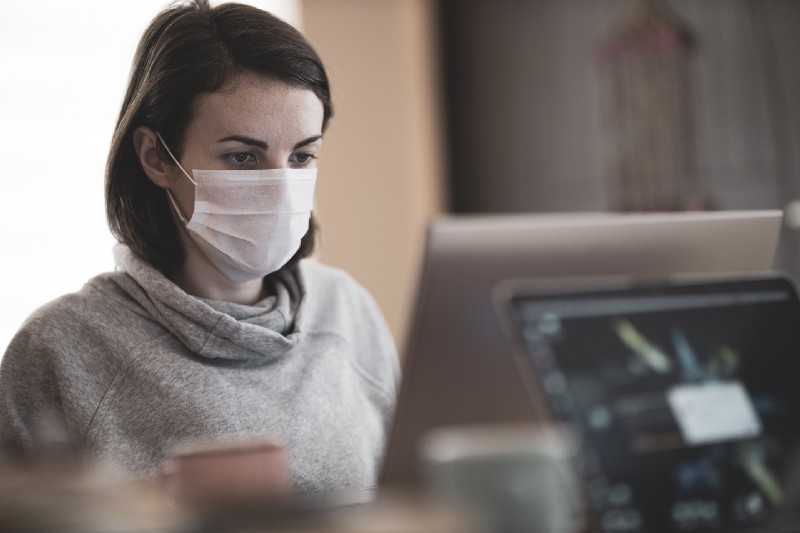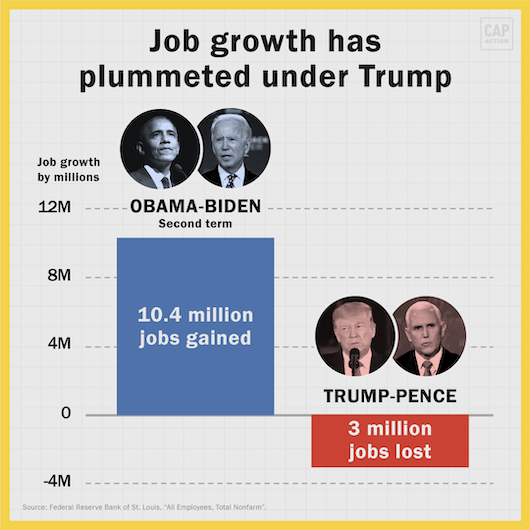This piece was originally published in the December 4, 2020 edition of CAP Action’s daily newsletter, the Progress Report. Subscribe to the Progress Report here.
 Photo by engin akyurt on Unsplash
Photo by engin akyurt on Unsplash
— Rep. Alexandria Ocasio-Cortez (D-NY), making the case for another round of $1,200 stimulus checks. The checks distributed earlier this year, paired with other direct payments in the form of unemployment assistance, proved to be some of the most successful programs in keeping Americans from falling into poverty, if only temporarily.
Just in case you forgot: Trump is the worst jobs president in American history.
Share this on Twitter and Facebook to get the facts out:

The latest round of jobs data was released this morning — and although we’re nearly a year into this pandemic, the outlook is still bleak. The short version is that the United States added 245,000 jobs in November. The long version calls for much more context.
- For starters, we are still not back to where we were before the pandemic recession began early this year. Because of how many people lost their jobs in the spring, the recovery has been — and continues to be — slow. We’re still roughly 10 million jobs down from where we were in February. And that number rises to roughly 11.6 million jobs when you factor in the growth that didn’t happen while Americans were suffering through the early months of the pandemic.
- The jobs deficit is still worse than it was at the very worst point of every previous recession since World War II. You read that right: We are currently in a worse situation than we were at any point during the 2008 recession, among others.
- Job growth is getting slower and slower each month, and economists say we should be worried. “Slowing job growth is a disaster when you are 11.6 million jobs in the hole,” writes Heidi Shierholz of the Economic Policy Institute. “This is not the shape of recovery we want to be seeing right now.”
Despite all the data that paints a dark picture for American families and workers, Trump continues to lie about the reality of jobs numbers. This new piece from CAP Action revisits all the times he has misleadingly bragged about the dark reality of our pandemic recession while millions of Americans were — and still are — out of work.
- The lack of serious support for workers and small businesses hasn’t helped. With no new stimulus since the spring, and the Paycheck Protection Program doling out millions to big corporations while leaving small businesses out in the cold, many employers were either unable or unwilling to keep people on payroll while they closed up shop to comply with public health measures. Now that we’re in the middle of an even darker phase of the pandemic, Americans know what needs to be done: “Pay people to stay home.”
That brings us to the state of negotiations in Washington. Here’s the latest.
- Mitch McConnell appears to be holding firm on his own proposal, or at least a version of it. Senate Republicans are fairly set on including a liability waiver provision in the bill to protect businesses from being held accountable if employees contract COVID on the job. Senate Democrats, on the other hand, are pushing to ensure state and local governments can get the funding they need to keep the trains running.
- Speaker Pelosi and Leader Schumer are still attempting to negotiate a version of the less-than-ideal bipartisan proposal released earlier this week, ideally one that contains the aforementioned, much-needed state and local support. McConnell appears to be largely ignoring them. Nevertheless, Pelosi seems optimistic that the chambers will come to an agreement on the details of a compromise.
- Neither of those bills up for consideration contain arguably the most important provisions of earlier stimulus packages: $600 weekly supplemental unemployment benefits, and a $1,200 direct payment to everyone making under a certain income. But with just a week left to come to a deal before members of Congress are expected to head home for the holidays, some of them haven’t given up on these critical items.
- This afternoon, Rep. Alexandria Ocasio-Cortez (D-NY) and Rep. Rashida Tlaib (D-MI) announced they’d be pushing for another round of $1,200 direct payments to be included in the stimulus bill. It’s unclear how effective this will be in the end. But within moments of announcing her proposal, Ocasio-Cortez’s knack for garnering support from the strangest of allies for bold policies seemed to be paying off. Sen. Josh Hawley (R-MO), who is among the most conservative Republicans in Congress, reiterated his support for direct payments like those Ocasio-Cortez and Tlaib are pushing and said he’d gladly work with them to make it happen. We’ll believe it when we see it — but it’s certainly a hopeful sign.
- Late Friday afternoon, President-elect Joe Biden also expressed his support for including the $1,200 checks in the final bill.
IN CASE YOU MISSED IT
- A new report compiled by a commission of global health experts outlines how the climate crisis isn’t just a thing of the future — rather, it’s here, and it’s already doing damage. The report found that heat-related mortality for Americans over the age of 65 has nearly doubled over the past 20 years, with a record 19,000 deaths in 2018. As they presented their findings to the press this week, some doctors reportedly held back tears when asked about their experience treating patients during the pandemic. Experts say the surge in demand for hospital space in the wake of coronavirus outbreaks is a preview of how overwhelmed our hospitals could become under the full force of climate change.
- If you’ve been following the state of our justice system over the past few years, you’ve probably heard of the documentary 13th. If not, you can watch it here. In it, experts unpack the harsh reality that slavery was never fully ended in the United States, because the text of the 13th Amendment includes one exception to abolition: “except as a punishment for crime.” In practice, this means the state can (and does) use incarcerated people to perform free and grossly underpaid labor, or slave labor.
- This injustice is what a group of lawmakers is now trying to correct. In the wake of successful ballot measures that struck the codification of legalized slavery from several state constitutions last month, Sen. Jeff Merkley (D-OR) and Rep. William Lacy Clay (D-MO) introduced a Congressional resolution this week that would remove the exception from the 13th Amendment and expressly prohibit involuntary servitude as punishment for a crime.
WHAT WE’RE READING